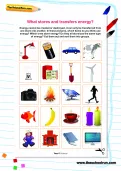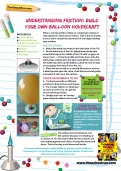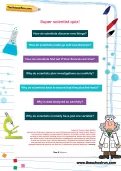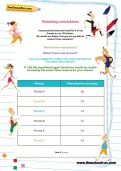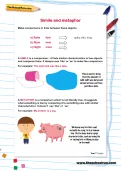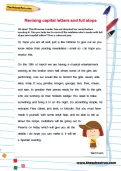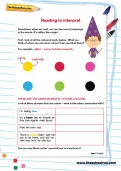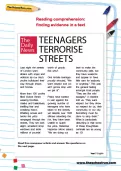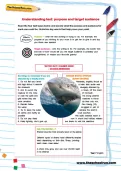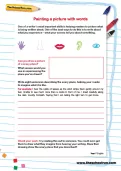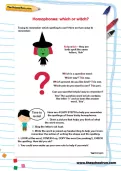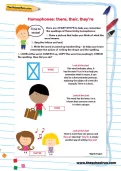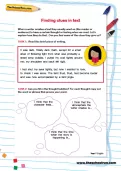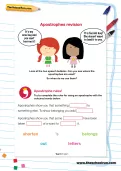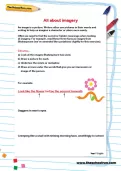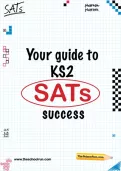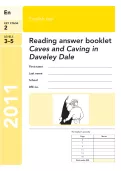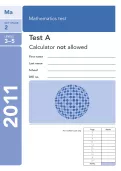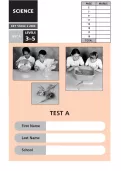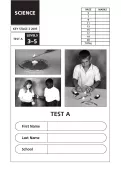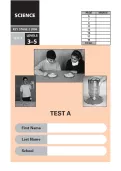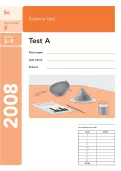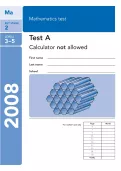Can your child identify similes and metaphors? This worksheet offers a quick reminder of how and when they're used and helps your child improve their descriptive writing by using them correctly.
or
Register to add to your saved resources
Already a subscriber? to view this content.
Full stops and capital letters can cause confusion, but correctly punctuated work is vital in Year 6 and beyond. Help your child feel confident about the rules with this revision worksheet activity.
or
Register to add to your saved resources
Already a subscriber? to view this content.
Help your child unlock hidden meaning in text with this worksheet about colour association. After reading an explanation and examples, can they put their knowledge into practice in their own writing? Suggested answers are included so you can look over their work and help them improve it.
or
Register to add to your saved resources
Already a subscriber? to view this content.
This activity, aimed at Year 7 or advanced primary school pupils, will help your child analyse and break down a text to find evidence for their answers. What words have been used to create an impact? What images have been painted for the reader? Work through this activity step by step to practise reading comprehension.
or
Register to add to your saved resources
Already a subscriber? to view this content.
Time for some text analysis! Can your child identify the purpose and target audience of different types of text which all relate to the same subject? They will need to look for key words to help them prove their point.
or
Register to add to your saved resources
Already a subscriber? to view this content.
This worksheet will help improve your child's descriptive writing by encouraging them to draw on their sensory experiences. Can they describe a scary place through smell, hearing, sight, touch and taste? What will a reader picture after hearing their text?
or
Register to add to your saved resources
Already a subscriber? to view this content.
Is your child finding it hard to remember how to use and spell the homophones 'which' and 'witch'? Help them clear up the confusion with this practice worksheet.
or
Register to add to your saved resources
Already a subscriber? to view this content.
Help your child get a few difficult homophones straight with this worksheet. There, their and they're all sound the same, but their meanings are very different. Master the tricky spellings with a simple, four-step learning trick.
or
Register to add to your saved resources
Already a subscriber? to view this content.
Test reading comprehension skills with some thorough analysis of a short piece of text. What atmosphere, emotion and setting does the writer convey? What effective techniques are used? A KS3 worksheet, also suitable to stretch gifted Year 6 pupils.
or
Register to add to your saved resources
Already a subscriber? to view this content.
A revision worksheet to remind your child of the rules of correct apostrophe use. Can they reword sentences to show they understand when an apostrophe indicates belonging and when it's used to show that letters have been taken out of a word?
or
Register to add to your saved resources
Already a subscriber? to view this content.
Imagery is used in writing to help us imagine a place or character more clearly. This worksheet helps your child practise identifying imagery and then come up with their own metaphors and similes to enrich their descriptive writing.
or
Register to add to your saved resources
SATs tests in Year 6 can be a daunting prospect for teachers, parents and children. Give your child a head start with SATs preparation and boost their confidence about the exams with our guide, packed with tips, tricks and practical suggestions.
or
Register to add to your saved resources
Already a subscriber? to view this content.
Download and print this complete 2011 English SATs papers pack and help your child to prepare for their SATs.
or
Register to add to your saved resources
Download and print this complete set of maths SATs papers from 2011 and the associated mark scheme to assist your child in preparing for the Y6 tests.
or
Register to add to your saved resources
Download and print this complete set of Science SATs papers from 2004 to assist your child in preparing for the Y6 tests.
or
Register to add to your saved resources
Download and print this complete set of 2005 Science SATs papers to assist your child in preparing for the Y6 tests.
or
Register to add to your saved resources
Download and print this complete set of Science SATs papers from 2006 to assist your child in preparing for the tests.
or
Register to add to your saved resources
Download and print this complete set of Science SATs papers from 2007 to assist your child in preparing for the tests.
or
Register to add to your saved resources
Download and print this complete set of Science SATs papers from 2008 to assist your child in preparing for the Y6 tests.
or
Register to add to your saved resources
Download and print this complete set of KS2 Maths SATs papers from 2008 to assist your child in preparing for the tests.
or
Register to add to your saved resources
